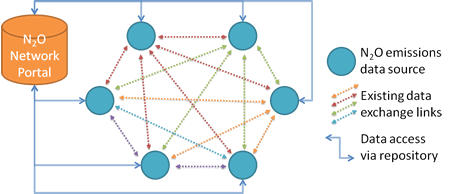Information For Researchers
Rationale for an N2O research data repository
By collating a large diverse set of data in one place, the portal will ensure the best solutions can be provided for reducing N2O emissions whilst sustaining the productivity of farming systems.
Access to a larger data pool will also raise the prospect of calibrating and validating models that rely on the synthesis of greenhouse gas emissions data.
The standardised methods implemented by the network are essential to making evidence-based policy on climate change mitigation more robust.
The repository plays a significant role in ensuring the science behind agricultural N2O soil emissions in Australia more robust, as well as more open to scrutiny and use by the international community.
The N2O emissions data repository
One objective of the N2O Network is to create a data portal that aggregates N2O (and other non-CO2 gases) and makes it available to the wider climate change community.
The repository creates a conduit to share and access research data from the various N2O sites in the network. The repository will serve all the data using standard data formats and data sharing protocols.

The flow of research data in the N2O Network
Datasets stored in the repository contains detailed descriptions of relevant data the collection methods. Research data will be readily available for download in a standard file format and in compliance with a data protocol.
A set of terms and conditions governs how research data can be used and shared. An authentication system limits data access to accredited users only. By agreeing to the terms and conditions, these accredited users gain the authority to immediately access the data.
Community-driven standards and protocols
The IT platform underlying the data portal is KNB Metacat. Metacat is a community-driven data repository that was specifically developed to store ecological research data. It has a built-in web interface to search and download ecological data. Metacat has been successfully deployed at a number of ecological research sites around the world.
Data stored in Metacat will comply with an N2O data protocol that is largely based on those of ICASA (International Consortium for Agricultural Systems Applications) standards. The protocol specifies data collection methods, the parameters required for each dataset and what additional descriptions (metadata) are expected.
Ecologists interact with Metacat by using Morpho. Morpho is a software assistant to add critical metadata to research data collection and annotate datasets. It also helps track new versions of the data and to upload the latest version of the datasets to the repository.
N2O Metadata Standard
The N2O Metadata Standard has been developed by network researchers as a guide to preparing data for upload to the N2O repository. It is available in pdf
